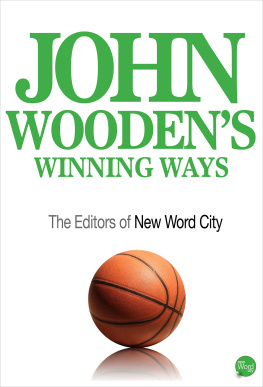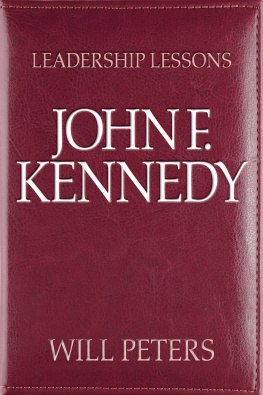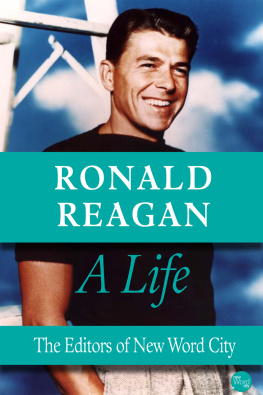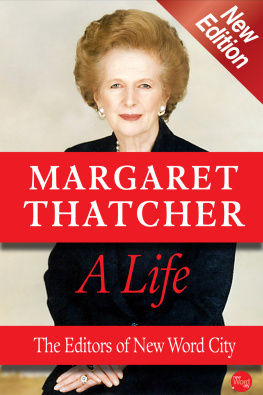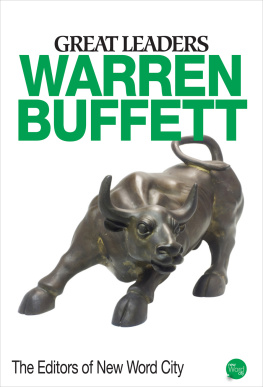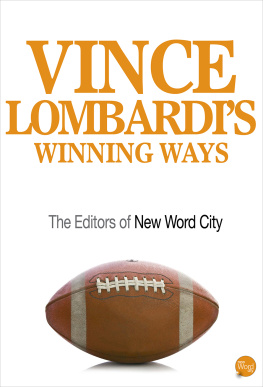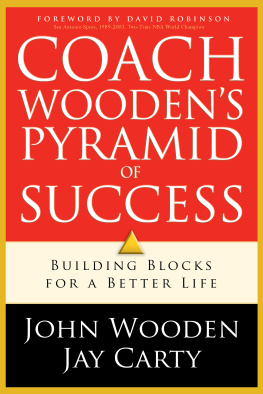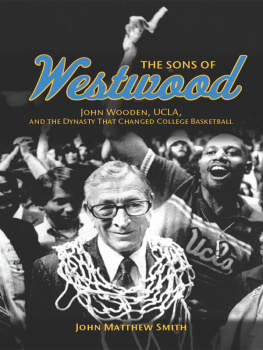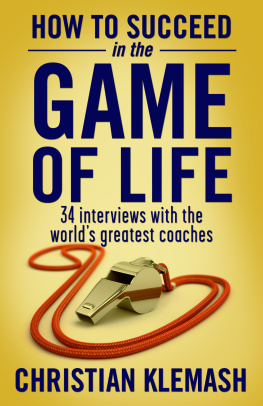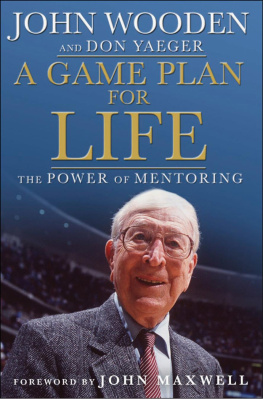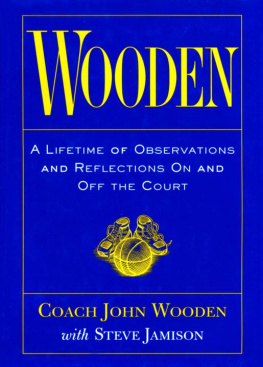The Editors of New Word City - John Wooden’s Winning Ways
Here you can read online The Editors of New Word City - John Wooden’s Winning Ways full text of the book (entire story) in english for free. Download pdf and epub, get meaning, cover and reviews about this ebook. year: 2014, publisher: New Word City, genre: Detective and thriller. Description of the work, (preface) as well as reviews are available. Best literature library LitArk.com created for fans of good reading and offers a wide selection of genres:
Romance novel
Science fiction
Adventure
Detective
Science
History
Home and family
Prose
Art
Politics
Computer
Non-fiction
Religion
Business
Children
Humor
Choose a favorite category and find really read worthwhile books. Enjoy immersion in the world of imagination, feel the emotions of the characters or learn something new for yourself, make an fascinating discovery.
- Book:John Wooden’s Winning Ways
- Author:
- Publisher:New Word City
- Genre:
- Year:2014
- Rating:4 / 5
- Favourites:Add to favourites
- Your mark:
- 80
- 1
- 2
- 3
- 4
- 5
John Wooden’s Winning Ways: summary, description and annotation
We offer to read an annotation, description, summary or preface (depends on what the author of the book "John Wooden’s Winning Ways" wrote himself). If you haven't found the necessary information about the book — write in the comments, we will try to find it.
Leadership isnt about winning; its about helping people succeed in life. Thats the message of John Wooden, one of college basketballs greatest coaches. His UCLA Bruins piled up a record that may never be surpassed. Wooden saw himself primarily as a teacher, argues this short-form book, and his sense of values and priorities was his bedrock. Leaders everywhere can improve their game by following his example.
The Editors of New Word City: author's other books
Who wrote John Wooden’s Winning Ways? Find out the surname, the name of the author of the book and a list of all author's works by series.
John Wooden’s Winning Ways — read online for free the complete book (whole text) full work
Below is the text of the book, divided by pages. System saving the place of the last page read, allows you to conveniently read the book "John Wooden’s Winning Ways" online for free, without having to search again every time where you left off. Put a bookmark, and you can go to the page where you finished reading at any time.
Font size:
Interval:
Bookmark:
John Woodens leadership talents made him the greatest coach in the history of college basketball, and a good case can be made that he was the greatest coach in any sport. His winning record with the University of California at Los Angeles, including 10 national championships (seven of them consecutive), 88 straight winning games, and four unbeaten seasons, may never be matched. His Bruins won with both superstars, chief among them Kareem Abdul-Jabbar and Bill Walton , and a squad of seemingly ordinary players. Hes one of only three men named to the Basketball Hall of Fame both as a coach and a player. And Woodens story, maxims, and winning ways provide solid lessons for anyone who is or wants to be a leader.
Wooden was a modest man, a soft-spoken, teetotaling Hoosier whose strongest epithet was Goodness gracious sakes alive! In the glamour of Los Angeles, The New Yorker once said, he was an island of James Whitcomb Riley in a sea of Ken Kesey , the Grateful Dead , Terry Southern , and Jerry Rubin . But his determination to win was fierce.
John Wooden always saw himself primarily as a teacher, not a coach. Coach Wooden enjoyed winning, but he did not put winning above everything, Abdul-Jabbar once wrote. He was more concerned that we became successful as human beings, that we earned our degrees, that we learned to make the right choices as adults and as parents. In essence, he was preparing us for life.
That sense of values and priorities was the bedrock of Woodens leadership. But there are many more lessons to be learned from his story.
John Robert Wooden was born on October 14, 1910, on a hardscrabble Indiana farm with no electricity and a three-hole outhouse. His father, Joshua, taught his six children to cherish honesty, hard work, and the value of education. All his life, Wooden carried a handwritten copy of his fathers seven-point creed in his wallet: Be true to yourself. Make each day your masterpiece. Help others. Drink deeply from good books, especially the Bible. Make friendship a fine art. Build a shelter against a rainy day. Pray for guidance, and give thanks for your blessings every day.
Woodens first basketball was a black cotton sock that his mother, Roxie, had stuffed with rags; he tossed it through a tomato basket nailed to the barn wall. But he learned. At Martinsville High School, he was the star of the team, leading it to three consecutive state finals and winning the title in 1927. He made the all-state team three times. Most of the Big 10 colleges recruited him. Even though it had no athletic scholarships, Wooden chose Purdue for its academic standards and its coach, Ward Piggy Lambert .
Though he was only five feet 10 inches tall, Wooden became the Boilermakers star. He was a daring, scrambling player, who was nicknamed the India Rubber Man for the way he dove for loose balls and bounced up again. School officials would station two men behind the basket to catch Wooden before he hurtled into the crowd on his wild drives to score. Once, when he was knocked to the floor near the free-throw line, a rebound came his way before he could get up. Still sitting, he launched the basket that won the game. Wooden led Purdue to its only national championship in 1932, and he was a three-time All-American.
After graduating at the height of the Great Depression , Wooden played semi-pro ball with small teams and managed to save a whopping $909.05, including $100 that the owner of one of his teams gave him for making 134 consecutive free throws in competition. But two days before he was to marry Nellie Riley, his high school sweetheart and the only girl I ever dated, the bank went bust. A family friend heard of the bank failure and offered to loan Wooden $200. Although Wooden was strictly against borrowing money, he took it out of desperation to pay for the wedding and honeymoon and cadged a ride to his first coaching job, in Dayton, Kentucky. He spent 11 successful years coaching high school ball there and in South Bend, Indiana, before joining the Navy in World War II as a physical trainer for pilots.
After the war, Wooden coached for two years at Indiana State Teachers College, where he piled up a winning record but is best remembered for a game he refused to play. His team was asked to participate in a national tournament - but its one black player, a reserve guard, was disinvited. Wooden declined. The next year, with an even better record, Indiana State was invited again, and after some negotiating, the guard, Clarence Walker, became the first black player to participate in the tournament.
UCLA and Minnesota both tried to hire John Wooden. He would have preferred Minnesota, but fate diverted him. A storm snowed in the Minnesota athletic director. By the time he got through to Wooden with his offer, his deadline had expired by an hour and Wooden had signed with UCLA. The Minnesota athletic director pleaded for a second chance, but Wooden wouldnt break his word.
He was dismayed when he arrived at the UCLA campus in Westwood. The Bruins had scored only three winning seasons in the past 17 years, and their level of talent was dismal. Wooden had been led to believe that the college was about to build a new basketball arena, but that didnt happen until 17 years later. In his first years at UCLA, games were played in the mens gymnasium, a cramped and overheated building that came to be called, with reason, the B.O. Barn. The team had to share the structure with gymnasts and other athletes, and Wooden and his student managers had to mop the floor before their practices to get rid of hazardous chalk dust. The pull-out bleachers seated only 2,500 spectators.
Despite all the obstacles, Wooden established his favorite fast-break offense, a tactic foreign to the slow, deliberate pace of most West Coast teams. He stressed fitness, quickness, and all-out selfless teamwork, and his first UCLA team ended the 1948 season with 22 wins and only seven defeats. The next year, the Bruins won their conference championship, and the winning seasons continued. After a few years, fire marshals ruled that the B.O. Barn was unsafe for crowds of more than 1,000, so to house the growing number of fans and bring in revenue, the Bruins began playing home games at a variety of arenas in the Los Angeles area. Players said the lack of a home gym hurt their chances for a major championship, but Wooden said they were toughened by the hardship and better able to deal with hostile crowds at their away games.
Los Angeles sportswriters began calling him the wizard of Westwood, a name he despised. In his early years at UCLA, his competitiveness put off some players, opponents, and especially officials, whom he rode hard from the bench. Dadburn it, you saw him double dribble down there! Wooden would holler at the referee. Goodness gracious sakes alive! Everybody in the place saw that. One of his assistants, Eddie Powell, said years later that the yelling was a psychological tactic - that Wooden would jump on an official in the first half only to apologize at halftime, and close calls tended to go his way after that.
To his players in those years, Wooden was a mixed blessing. His practice sessions were meticulously planned and scripted; he kept diaries of all practices and tried to improve on the sequence and precise mix of techniques and skills that he was teaching. After those sessions, players said, the actual games were comparatively easy - and a relief. And Woodens intensity could be scary. I wish just once hed swear at me, a former player told Dwight Chapin and Jeff Prugh in their 1973 book, The Wizard of Westwood. He puts more venom into his Goodness gracious sakes alive! than any Marine drill sergeant or hippie protestor Ive ever heard.
The Bruins kept on winning. But a national championship was what Wooden wanted, and it proved elusive. UCLA made three trips to the National College Athletic Association tournament, but lost in the first round each time. By the late 1950s, the team seemed to be losing its momentum. So Wooden decided to change his ways. As he put it in one of his famous maxims, Failure is not fatal. Failure to change might be. Or, as a sign on his office wall reminded him, Its what you learn after you know it all that counts.
Next pageFont size:
Interval:
Bookmark:
Similar books «John Wooden’s Winning Ways»
Look at similar books to John Wooden’s Winning Ways. We have selected literature similar in name and meaning in the hope of providing readers with more options to find new, interesting, not yet read works.
Discussion, reviews of the book John Wooden’s Winning Ways and just readers' own opinions. Leave your comments, write what you think about the work, its meaning or the main characters. Specify what exactly you liked and what you didn't like, and why you think so.

